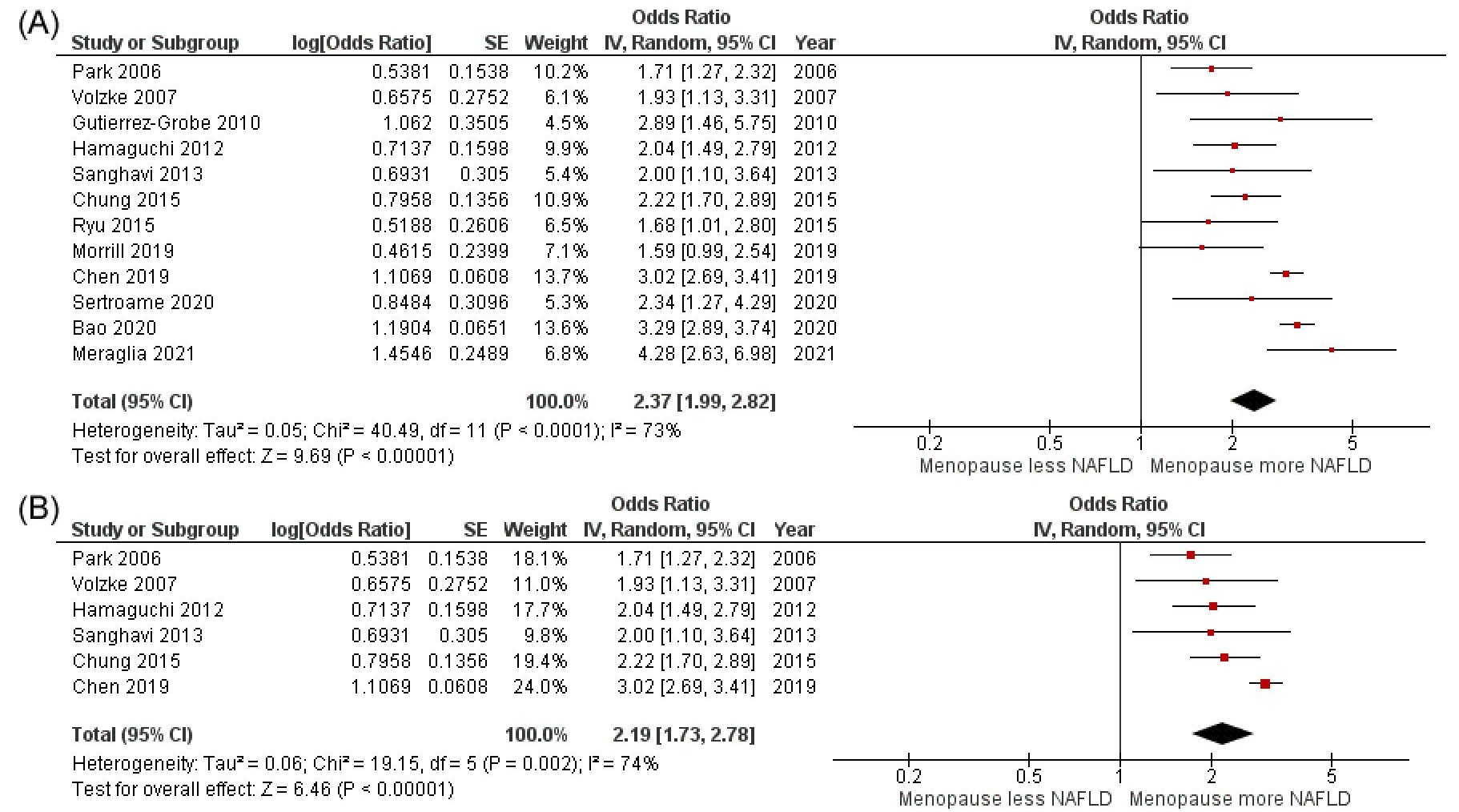Back
Poster Session E - Tuesday Afternoon
E0505 - Menopausal Status and Risk of Nonalcoholic Fatty Liver Disease: A Systematic Review and Meta-Analysis
Tuesday, October 25, 2022
3:00 PM – 5:00 PM ET
Location: Crown Ballroom

Aunchalee Jaroenlapnopparat, MBBS
Mount Auburn Hospital
Cambridge, MA
Presenting Author(s)
Aunchalee Jaroenlapnopparat, MD1, Nipith Charoenngam, MD1, Ben Ponvilawan, MD2
1Mount Auburn Hospital/Beth Israel Lahey Health, Cambridge, MA; 2Taussig Cancer Institute, Cleveland Clinic, Cleveland, OH
Introduction: Previous studies reported that nonalcoholic fatty liver disease (NAFLD) tended to be associated with menopausal status, although the strength of evidence is limited given the inconsistent results across the studies and limited number of participants included in some studies. This meta-analysis aims to pool data from all previous studies and determine whether menopausal status is a risk factor for NAFLD.
Methods: Potentially eligible studies were identified from Embase, Medline, and Web of Sciences databases from inception to December 2021 using search strategy that comprised of terms for “nonalcoholic fatty liver disease” and “menopause”. Eligible study must consist of cases with NAFLD and controls without NAFLD. Then the study must explore history of menopausal status in each group and report effect estimates and 95% Confidence Interval (95% CI) of the association between presence NAFLD and menopausal status. We extracted such data from each study and calculated pooled odds ratio (OR) by combining effect estimates of each study using random-effects model. Funnel plot was used to assess for the presence of publication bias.
Results: A total of 587 articles were identified. After two rounds of independent review by two investigators, 12 studies fulfilled the eligibility criteria and were included into the meta-analysis. The meta-analysis of 12 studies consisting of 160,306 participants revealed the significant association between menopausal status and presence of NAFLD with the pooled OR of 2.37 (95%CI 1.99 – 2.82, I2 73%, Figure 1A). The association remained significant in a subgroup meta-analysis of 6 studies that reported the association with adjustment for age and metabolic factors with the pooled OR of 2.19 (95%CI 1.73 – 2.78, I2 74%, Figure 1B). The funnel plot for was fairly symmetric and was not suggestive of publication bias.
Discussion: The meta-analysis revealed that menopausal status was associated with approximately 2.4 increased likelihood of NAFLD. The association remained significant in a subgroup meta-analysis of studies with adjustment for age and metabolic factors, suggesting that menopausal status could be an independent risk factor for NAFLD.

Disclosures:
Aunchalee Jaroenlapnopparat, MD1, Nipith Charoenngam, MD1, Ben Ponvilawan, MD2. E0505 - Menopausal Status and Risk of Nonalcoholic Fatty Liver Disease: A Systematic Review and Meta-Analysis, ACG 2022 Annual Scientific Meeting Abstracts. Charlotte, NC: American College of Gastroenterology.
1Mount Auburn Hospital/Beth Israel Lahey Health, Cambridge, MA; 2Taussig Cancer Institute, Cleveland Clinic, Cleveland, OH
Introduction: Previous studies reported that nonalcoholic fatty liver disease (NAFLD) tended to be associated with menopausal status, although the strength of evidence is limited given the inconsistent results across the studies and limited number of participants included in some studies. This meta-analysis aims to pool data from all previous studies and determine whether menopausal status is a risk factor for NAFLD.
Methods: Potentially eligible studies were identified from Embase, Medline, and Web of Sciences databases from inception to December 2021 using search strategy that comprised of terms for “nonalcoholic fatty liver disease” and “menopause”. Eligible study must consist of cases with NAFLD and controls without NAFLD. Then the study must explore history of menopausal status in each group and report effect estimates and 95% Confidence Interval (95% CI) of the association between presence NAFLD and menopausal status. We extracted such data from each study and calculated pooled odds ratio (OR) by combining effect estimates of each study using random-effects model. Funnel plot was used to assess for the presence of publication bias.
Results: A total of 587 articles were identified. After two rounds of independent review by two investigators, 12 studies fulfilled the eligibility criteria and were included into the meta-analysis. The meta-analysis of 12 studies consisting of 160,306 participants revealed the significant association between menopausal status and presence of NAFLD with the pooled OR of 2.37 (95%CI 1.99 – 2.82, I2 73%, Figure 1A). The association remained significant in a subgroup meta-analysis of 6 studies that reported the association with adjustment for age and metabolic factors with the pooled OR of 2.19 (95%CI 1.73 – 2.78, I2 74%, Figure 1B). The funnel plot for was fairly symmetric and was not suggestive of publication bias.
Discussion: The meta-analysis revealed that menopausal status was associated with approximately 2.4 increased likelihood of NAFLD. The association remained significant in a subgroup meta-analysis of studies with adjustment for age and metabolic factors, suggesting that menopausal status could be an independent risk factor for NAFLD.

Figure: Figure 1A) Forest plot of the meta-analysis of the association between nonalcoholic fatty liver disease and menopausal status, 1B) Forest plot after adjusted for age and metabolic factors
Disclosures:
Aunchalee Jaroenlapnopparat indicated no relevant financial relationships.
Nipith Charoenngam indicated no relevant financial relationships.
Ben Ponvilawan indicated no relevant financial relationships.
Aunchalee Jaroenlapnopparat, MD1, Nipith Charoenngam, MD1, Ben Ponvilawan, MD2. E0505 - Menopausal Status and Risk of Nonalcoholic Fatty Liver Disease: A Systematic Review and Meta-Analysis, ACG 2022 Annual Scientific Meeting Abstracts. Charlotte, NC: American College of Gastroenterology.
